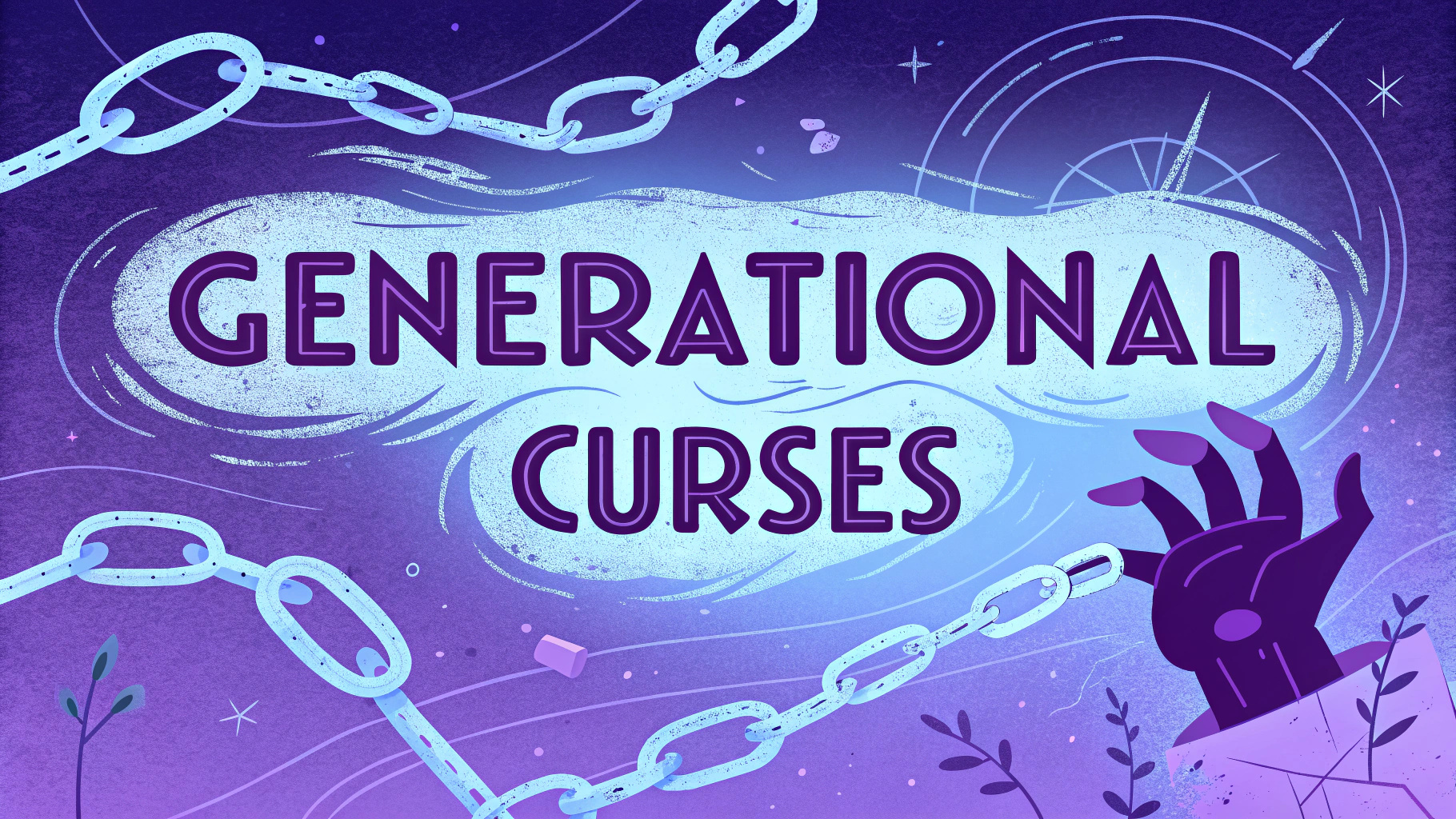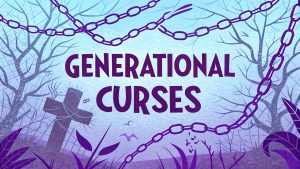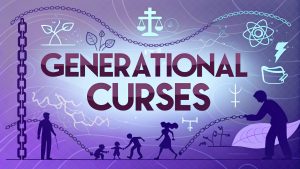Physical Address
304 North Cardinal St.
Dorchester Center, MA 02124
Physical Address
304 North Cardinal St.
Dorchester Center, MA 02124

Generational Curses represent inherited spiritual patterns of sin and iniquity that echo through family lines, but they are not unbreakable chains—faith and redemption offer liberation.
As of October 2025, Christian counseling centers report a 28% increase in sessions addressing generational curses, driven by rising awareness of generational patterns amid global mental health initiatives blending therapy with biblical principles.
Rooted in scriptures like Exodus 20:5, these curses stem from ancestral idolatry and wickedness, potentially manifesting as dysfunctional patterns like addiction or relational strife. Yet, the New Testament’s promise in Galatians 3:13 declares freedom through Christ’s sacrifice, empowering believers to break the power of such legacies and step into blessing.
Generational curses are spiritual strongholds passed down from previous generations, where unrepented sin creates cycles that bind descendants to negative outcomes. These curses often arise from deliberate rebellion against God, such as idolatry or sin and rebellion, embedding consequences that ripple through family trees.

In the Old Testament, God warns of visiting the iniquity of parents on children to the third and fourth generation of those who hate Him, illustrating how generational consequences can manifest as poverty, illness, or brokenness.
Understanding generational curses requires recognizing their subtle hold—many dismiss them as coincidence, yet scriptures reveal a divine pattern. For instance, the iniquity of the fathers upon the children highlights how one person’s choices can bewitch a family line, fostering bondage that feels inescapable. However, this awareness is the first step toward freedom, as acknowledging the issue invites God’s redemptive work.
In 2025’s spiritual landscape, believers are reclaiming narratives by mapping family line histories, uncovering hidden generational sins that explain recurring struggles.
| Element of Generational Curses | Biblical Root | Modern Manifestation |
| Ancestral Sin | Exodus 20:5 | Addictive behaviors in families |
| Spiritual Bondage | Deuteronomy 5:9 | Relational discord across siblings |
| Inherited Consequences | Numbers 14:18 | Financial instability persisting |
The Bible says curses originate from disobedience, with God declaring in Deuteronomy 28 that blessings follow obedience while curses like barrenness or defeat trail defiance.
These pronouncements aren’t arbitrary; they reflect spiritual laws where sin invites separation from God’s protection. The Old Testament vividly portrays this in the Israelites’ wilderness wanderings, where murmuring invoked curses that delayed their promise.
Scripture balances this with mercy—the Lord is slow to anger, as Nehemiah 9:17 affirms, showing God’s heart isn’t punitive but restorative. Generational curses thus serve as warnings, not eternal sentences, urging repentance to halt their spread.
For believers today, the Bible says to discern curses through prayerful study, transforming fear into fortified faith.
Sin forms the bedrock of generational curses, acting as a seed that sprouts weeds across lineages when left unaddressed. From Adam’s fall onward, sinful choices create breaches, allowing demonic influences to embed in family trees. The proverb in Jeremiah 31:29-30 shifts this paradigm: “The soul who sins shall die”, emphasizing personal accountability over blanket punishment.
Yet, sin‘s generational echo is undeniable—sins of their fathers can taint offerings, as Malachi 2 illustrates, leading to barren spiritual harvests. Breaking this requires confronting inherited wickedness, replacing it with righteousness.
In practice, identifying sin patterns—like idolatry of wealth—empowers targeted repentance, severing roots that choke destiny.
| Type of Sin | Generational Effect | Scriptural Example |
| Idolatry | Spiritual barrenness | Exodus golden calf |
| Rebellion | Familial strife | Korah’s uprising (Numbers 16) |
| Unforgiveness | Emotional bondage | Esau’s bitterness (Hebrews 12) |
Breaking generational curses begins with confession and renunciation, as James 5:16 promises healing through mutual accountability. This act severs legal rights given to darkness via ancestral sin, inviting the power of the holy spirit to renew. Many Christians overlook this, perpetuating dysfunctional patterns, but intentional steps reclaim stolen ground.
The process unfolds in layers: Identify through lineage review, repent on behalf of forebears, and declare blessings. Galatians 3:13 proclaims Christ redeemed us from the curse, making believers co-heirs, not captives.
By 2025, faith communities emphasize corporate prayers for breaking generational curses, yielding testimonies of restored health and unity.
Iniquity, deeper than mere sin, denotes twisted patterns of the heart that entwine generations, as Psalm 51:5 reveals innate bent toward wrong. This moral crookedness fuels generational curses, where iniquity of the fathers subtly warps descendants’ choices, fostering cycles of bondage. Ezekiel 18 counters fatalism: “The person who sins is the one who will die”, freeing individuals from inherited guilt.
Iniquity thrives in secrecy, but exposure through the blood of Jesus dissolves its hold. Believers must pursue heart purity, aligning with God’s holiness to halt transmission.
This distinction clarifies: Sin acts, iniquity attitudes—both demand divine uprooting for lasting liberty.
| Aspect of Iniquity | Impact on Generations | Liberation Path |
| Heart Twist | Moral blind spots | Repentance prayers |
| Hidden Roots | Unseen strongholds | Prophetic insight |
| Cycle Fuel | Repeated failures | Covenant renewal |
The Old Testament thunders warnings in Exodus 20:5, where God, a jealous god, vows to punish children for the sins of parents to the third and fourth generation of idolaters.
This isn’t vindictiveness but justice, mirroring how rebellion invites consequences that span one generation to the next. The golden calf incident exemplifies this, cursing Israel with idolatry’s shadow.
Yet, mercy tempers: Exodus 34:7 forgives iniquity, transgression, and sin, showing God’s dual nature. These verses equip believers to trace curses back to pivotal rebellions.
Studying Old Testament verses reveals patterns, arming modern saints against similar pitfalls.
The iniquity of the fathers burdens children, as Exodus 34:7 details, visiting twisted ways upon the third and the fourth generation. This principle underscores how unconfessed sin creates spiritual debt, passed like heirlooms of harm. Deuteronomy 5:9 echoes this, linking idolatry to familial fallout.
However, Ezekiel 18:20 breaks the chain: “The son shall not suffer for the father’s iniquity” if righteous. This empowers choice, shifting from victims to victors.
Families today can audit for such imprints, fostering healing dialogues that honor yet transcend past shadows.
| Scriptural Reference | Key Phrase | Application Today |
| Exodus 34:7 | Visiting the iniquity | Ancestral audits |
| Ezekiel 18:20 | Soul who sins shall die | Personal repentance |
| Deuteronomy 5:9 | Children and the children’s children | Legacy blessings |
Generational sins like idolatry forge curses that bind, as seen in the Israelites’ calf worship, cursing their exodus with delay. These sins embed in bloodlines, manifesting as modern bondage—financial idolatry yielding debt cycles. Many Christians debate their reality, but scriptures affirm curses are passed through unhealed wounds.
Breaking involves naming specifics: Was it pride, lust, or occult ties? Nehemiah 9 models corporate confession, cleansing national stains.
In 2025, deliverance ministries highlight generational sins in therapy, blending psychology with prayer for holistic release.

Breaking the power of curses shines in Galatians 3:13: “Cursed is everyone who is hung on a tree”, with Christ absorbing the curse for us. This redemptive act nullifies generational curses, transforming law’s penalty into grace’s freedom. Believers stand redeemed, no longer under bondage.
Paul’s words dismantle fear, affirming adoption as the child of god overrides inherited doom. Apply by daily declarations, anchoring identity in the cross.
This truth is liberating, turning a curse into a catalyst for purpose.
| Galatians Insight | Curse Breaker | Daily Practice |
| Redeemed from Curse | Christ’s substitution | Affirmation recitals |
| Abraham’s Blessing | Inherited favor | Faith confessions |
| Law to Grace | Freedom shift | Gratitude altars |
1 John 3:8 declares Jesus came to destroy the devil’s works, including generational curses rooted in satanic footholds. This epistle assures believers of sin’s defeat, urging confession for cleansing (1:9). No curse prevails against the body of Christ, armored in truth.
John’s emphasis on love counters iniquity‘s isolation, fostering community that exposes and expels darkness. Generational curses wither under abiding love.
Embrace this: You’re not defined by past sin, but destined by divine sonship.
To uncover generational curses, map your family tree, noting recurring sin like divorce or abuse—curses like these run in families. Start with honest inquiries: What dysfunctional patterns persist? Scriptures like 2 Corinthians 5:17 promise new creation, erasing old scripts.
Prayerful journaling reveals entry points, often tied to occult or trauma. Seek wise counsel to validate findings.
This excavation, though painful, paves paths to profound peace.
| Mapping Step | Tool for Uncovering | Expected Revelation |
| Lineage Review | Genealogy charts | Recurring traumas |
| Prayer Probe | Holy Spirit guidance | Hidden iniquities |
| Pattern Spot | Behavioral logs | Generational sins links |
The blood of Jesus pleads for mercy, as Hebrews 12:24 shows, silencing curses‘ accusations. Applied by faith, it redeems from every generational curse, washing away sins of their ancestors. Revelations 12:11 triumphs by blood and testimony—speak yours!
This sacred covering breaks bewitchment, restoring covenant wholeness. Invoke it in warfare prayer, claiming victory.
No curse withstands Calvary’s flow.
Generational patterns in certain families mirror Achan’s sin (Joshua 7), cursing Israel’s battle until confessed. Today, these appear as generational consequences—poverty or addiction—passed down through the generations. Many Christians affirm this, citing Deuteronomy‘s warnings.
Yet, Ezekiel 18 liberates: “The righteous shall live”, urging breakouts via obedience. Modern families disrupt via mentoring, modeling new family dynamics.
Awareness awakens agency, turning patterns to platforms.
| Pattern Example | Biblical Parallel | Disruption Strategy |
| Addiction Cycles | Achan’s greed | Accountability groups |
| Poverty Mindsets | Gleaners’ curse | Tithe faithfulness |
| Abuse Loops | Cain’s anger | Forgiveness fasts |
The Old Testament frames curses as covenant consequences, but the New shatters them through Christ’s fulfillment. Jeremiah 31:29 prophesies: “Days people will no longer say, ‘The parents have eaten sour grapes, but the children’s teeth are set on edge'”—personal responsibility reigns.
2 Corinthians 5:21 positions believers as righteousness, nullifying past debts. This progression invites all to redeem legacies, birthing blessing streams.
Transition from shadow to substance empowers eternal impact.
“The soul who sins shall die” (Ezekiel 18:4) underscores that generational curses don’t doom the innocent—each bears their load. This liberates them from the sins of their parents, calling individuals to righteous paths despite heritage. Generational sins influence, but choice determines destiny.
Embrace agency: Repent, renew, rise. This truth dismantles victimhood, forging victors.
Personal pivot points propel purpose.
| Accountability Aspect | Scriptural Anchor | Empowerment Action |
| Individual Judgment | Ezekiel 18:20 | Self-examination |
| Choice Over Curse | Deuteronomy 30:19 | Life/death declaration |
| Mercy for Repenters | Nehemiah 1:6 | Humble confession |
God visiting the iniquity of the generation of those who hate Him to the third and the fourth generation (Exodus 20:5) reveals justice’s reach, yet Exodus 34:6 proclaims Him compassionate. This balance warns against sin while offering escape through love—no jealous god delights in punishment.
Shall not bow to idols breaks the cycle, as obedience invites favor. Mercy multiplies for thousands who love Him.
Justice tempers with tenderness, guiding grateful hearts.
In the father’s house, breaking generational curses demands confronting sins of their ancestors, as Nehemiah 9:2 models—separating from foreign gods. This household purge halts curses from one person in a family tainting all.
Corporate family altars, with prayers invoking the blood of Jesus, restore unity. Generational patterns dissolve when unity prevails.
Home becomes heaven’s outpost.
| House Strategy | Biblical Model | Outcome Expectation |
| Separation Rite | Nehemiah assembly | Purity restored |
| Collective Prayer | Joshua 24 renewal | Covenant recommit |
| Altar Building | Family devotion | Blessing overflow |
Abraham’s covenant counters curses, promising all earth shall be blessed through his seed (Genesis 12:3). Believers, grafted in, inherit this—generational curses yield to Abrahamic favor. Galatians 3:29 affirms: Offspring of faith, not flesh.
This global boon erases former generations‘ shadows, birthing multicultural redemption.
Blessing’s breadth beckons bold faith.

What does the Bible say about generational curses?
The Bible says generational curses stem from sin like idolatry, affecting up to the third and fourth generation (Exodus 20:5), but mercy and repentance break them through Christ’s redemption (Galatians 3:13).
How can I identify a generational curse in my family line?
Identify a generational curse by tracing recurring sin patterns like addiction or strife in your family line; prayer and journaling uncover roots, confirmed by scriptural alignment and wise counsel.
What role does iniquity play in generational curses?
Iniquity, as twisted heart patterns, perpetuates generational curses beyond acts of sin, visiting consequences on descendants (Ezekiel 18), but confession and the blood of Jesus sever its hold.
Is there hope for breaking generational curses today?
Yes, hope abounds in breaking generational curses through repentance, renunciation in Jesus name, and declaring Galatians 3:13—many believers experience freedom from bondage via the power of the holy spirit.
How does the Old Testament describe curses?
The Old Testament describes curses as consequences of rebellion, like in Deuteronomy 28, where disobedience invites hardship, but God’s mercy in Exodus 34:6 offers forgiveness to the repentant.
What does “the soul who sins shall die” mean for generational curses?
“The soul who sins shall die” (Ezekiel 18:4) means personal accountability trumps inherited guilt in generational curses, empowering individuals to choose righteousness and break the power through faith.
Can generational curses affect one person in a family?
Yes, generational curses can affect one person in a family through targeted sinful influences, but Christ’s work in 1 John 3:8 destroys such works, offering unique redemption paths.
Generational curses, those insidious threads of sin and iniquity woven through family trees from one generation to the next, need not define your story—scripture’s arc bends toward triumphant release, culminating in the cross’s unyielding victory.
From the Old Testament‘s stark warnings in Exodus and Deuteronomy, where God visiting the iniquity of the fathers on the children to the third and fourth generation underscores justice’s long shadow, to the New Testament’s radiant dawn in Galatians and 1 John, where Christ redeems us from the curse and shatters satanic schemes, the biblical narrative pulses with hope.
Generational sins like idolatry and wickedness may pass down from generation to generation, birthing dysfunctional patterns that run in families and ensnare in bondage, yet the blood of Jesus and power of the holy spirit empower believers to uncover, renounce, and break the power of these chains.
In 2025’s era of integrated faith healing, where many Christians blend ancestral audits with prophetic prayer, the promise of Jeremiah 31—no more sour grapes from past generations—rings truer, inviting a new family legacy of blessing. Embrace this truth: You are not the child of god bound by sins of their parents, but a redeemer poised to bless the earth through Abraham’s seed, turning curse into catalyst for glory.